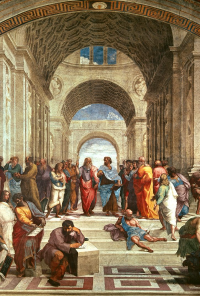The Good
Aristotle interrupted Musk.
“Ethics is the philosophical school of thought concerning what is ‘good’ and what is ‘bad,’ and how we can rationally discern between the two. I taught my son, Nicomachus, that ethics is a matter of balance to achieve virtue, which leads to happiness, to thriving. For every element of personality, there is a virtue and a vice. The vice can be excess or deficiency. For instance, there is the deficiency that is poor self-esteem, the excess that is arrogance, and the virtue that is the golden mean between the two - pride - "
"I think you are making matters too complicated," Socrates interjected.
"I would agree," stated Plato.
"Virtue, ethics, morality," Socrates continued, "is a matter of ownership. What we call 'wrong' or 'immoral' or 'evil' is the result of theft. 'Murder,' for instance, is the stealing of a life. 'Lying' is the stealing of truth. Justice, therefore, is a function of rightful property distribution, in terms of the body and mind alike."
"That's all great," said Musk, "but from the standpoint of defending humanity against the potential perils of AI, we must be more specific. The devil's in the details. For example, consider a self-driving car - a fully automated means of transportation. In this scenario, the car must choose between killing a world leader versus killing 10 civilians. It has 2,500 milliseconds to decide. What is the equation? What is the right choice?"
There was a long pause.
"Enter utilitarianism," I said, casually.
